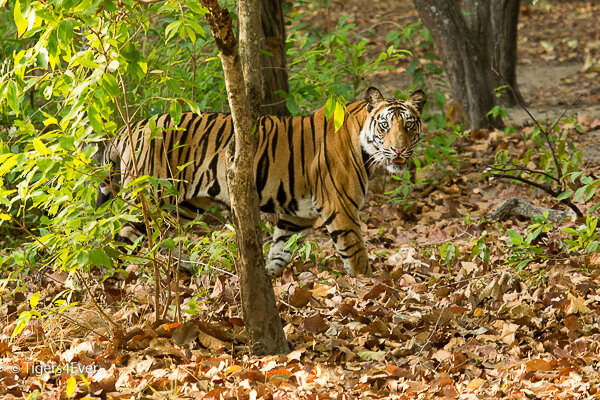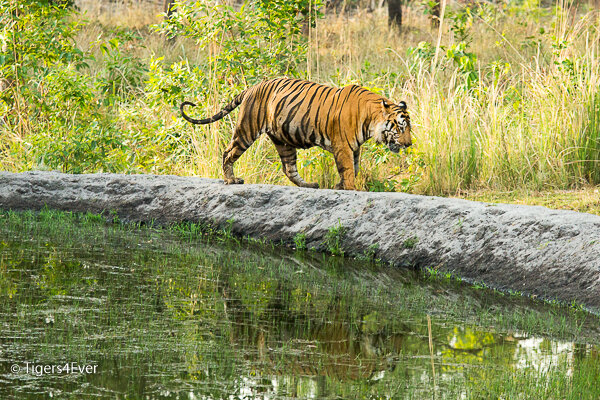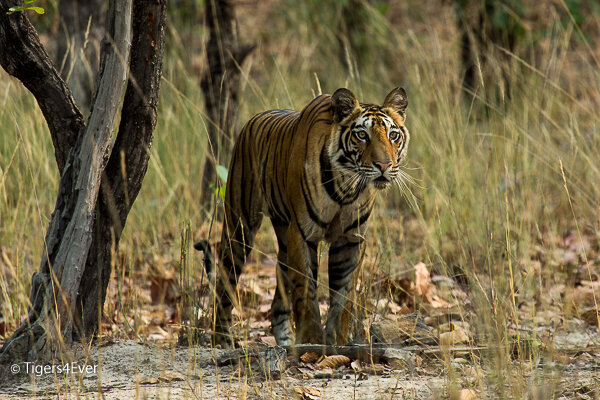By Dr. Corinne Taylor-Smith | Project Leader
Your tremendous support for our anti-poaching patrols in these challenging times is quite amazing, thank you. During the last few months where human-wildlife and tiger-tiger conflict have continued to be at 15-year highs, your generosity has ensured that we can keep our patrols tripled for the 6 months since the end of the 2023 monsoon and peak poaching season. Small charities like Tigers4Ever rely greatly on individual donors like you to be able to deliver our essential services to keep wild tigers safe. Thus, your donations are critical to ensuring that we can provide the best possible protection for the increasing wild tiger and cub population.
Conflict and Deaths are a Major Concern
The 2022 Tiger Census results were announced in July 2023, and confirmed that three quarters of the global wild tiger population is in India - 3167 wild tigers (785 of these are in Madhya Pradesh, where we work). Bandhavgarh’s wild tiger population has quadrupled from 37 in 2010, when Tigers4Ever was founded. A huge success story which would have been impossible without your help!
As wild tiger numbers increase, sadly the risk of poaching, tiger-tiger conflict and human-tiger conflict also increase, as wild tigers need more habitat and more protection. Every day we are kept busy as we try to address these challenges head on. The number of wild tigers dying across the whole of India reached a 15 year high in 2023 (181 reported deaths – 150% of 2022 figure)! Whilst the official death toll for 2024 already stands at 46 with 9 of the deaths due to tiger-tiger conflict in Bandhavgarh! It is therefore vitally important that we can continue our maximum level patrolling to keep wild tigers safe right now!
As wild tiger numbers continue to grow, there will be increases in the number of natural deaths due to territorial conflict because more wild tigers need more wild space, and fights are more frequent. It is hard to curb the lore of the jungle without expanding or improving the forest habitat, which is something we hope to do. We are working behind the scenes on forest rehabilitation initiatives, but launching large projects during a cost-of-living crisis brings significant fundraising challenges too. We are looking at funding options which will help us to start this long-term habitat restoration and expansion project, but that is taking time too. Meanwhile, we are working to improve the existing wild tiger habitat to try to reduce both human-wildlife and tiger-tiger conflict through our waterholes project: https://www.globalgiving.org/projects/water-for-bandhavgarhs-tigers/. In 2024, we have already started a new initiative to reduce human-wildlife conflict based on a scheme trialled in the Sundarbans. This project involves using solar powered street lighting at the point where the forest meets the entry point to the village to deter wild tigers entering the villages at night in search of prey. The early results are encouraging but we need to monitor progress over a longer period before we can claim success.
Enhancing protection for wild tigers and their habitat ensures that more cubs survive, which means more protection is needed, and as the number of wild tigers exceeds the carrying capacity of their current habitat, further urgent action is essential. We have already reached a critical impasse in both human-wildlife and tiger-tiger conflict.
Thankfully, our patrolling continues to keep unnatural wild tiger deaths at bay in Bandhavgarh, but we cannot let down our guard as poachers are always lurking and seeking opportunities to strike. Your kind donations and a grant we received from Tiger Awareness in 2024 has enabled us to fund increased patrolling into May 2024. We’re hoping that our supporters who are able to do so will choose to help our anti-poaching patrols to keep wild tigers safe throughout the drought season, the upcoming monsoon period and beyond (https://goto.gg/28767).
Human deaths are on the increase too, since the start of 2024 four more people have been killed by wild tigers, in addition to the six killed in the last part of 2023! The rollout of our safety education programme continues, but our patrollers still encounter lone herders in the forest grazing their cattle and putting their lives at risk! When questioned, they say that they are aware of the safety advice but grazing their cattle is more important! Our patrollers tell them that people have been killed in the area by wild tigers and that if they too are killed who will support their families, some listen – others don’t! Every human death result in significant unrest in the villages and, with it the risk of retaliatory attacks on tigers by angry villagers increases a thousand-fold! At the end of 2023, three different tigers were implicated in human killings, and two young male tigers were captured by the forest department and transferred to Van Vivar Zoo in Bhopal where they will spend the rest of their lives! It is no place for wild tigers to live out their lives no matter how large or good the zoo is! The third, a tigress with 4 sub-adult cubs, was also implicated alongside one of her male cubs, who was one of the two tigers transferred to Van Vivar zoo! The tigress was also captured and placed in an enclosure by the forest department leaving her remaining cubs to fend for themselves. In the last few weeks, the tigress and her second male cub were transferred to another national park where hopefully they will have an opportunity to flourish in the wild. Her female cubs remain in Bandhavgarh, but we must monitor the situation closely as they need to hunt for themselves and not resort to killing cattle as easier prey. Their father may provide some protection against intruding males but this is unlikely to be long-term as he has other cubs to protect and has lost his mate. Situations like this equate to human-tiger conflict at the extreme level and lead to dangerous challenging times for anti-poaching patrollers too, as they are tiger protectors and villagers often exact revenge on patrollers too. Our patrols need to always remain vigilant, especially whilst trying to restore calm. We continue to deliver our forest safety education training and banners in the nearby villages to try to reduce the risk of further deaths-whether human or tigers.
Our patrols often remove wires and snares set to capture wild boar and herbivores which enter the villages to raid the farmers’ crops and livestock fodder. The wires and snares are indiscriminate and have previously killed tigers and cubs. Precious tiger lives can easily be lost when they follow their prey into the villages in search of food, and is why our projects to reduce human-wildlife conflict form a vital cornerstone of our efforts to keep wild tigers safe.
We fight hard to keep both tigers and their prey out of the villages as it reduces the risk of retaliatory poisonings. The hot dry season has replaced the tough winter patrolling conditions for now, so the 805 warm winter jackets your donations helped to provide can be put away until the end of this year: https://goto.gg/56553. Grant funding from the Marjorie Coote Animal Charity Trust and from the Thin Green Line meant that only 200 patrollers will need warm winter jackets this winter, something which we hope to address after the monsoon. Our focus now turns to the 600 anti-poaching patrollers and chowkidars who desperately need full uniforms and boots as they have none. We recently supplied the first 205 of these uniforms and boots with grant funding help and this week ordered a full uniforms and boots for another 160 patrollers thank to the kindness of our friends at Typical Tigers NFT, but it will take a mammoth fundraising effort to supply the rest this year (£7050/US$9165). https://goto.gg/56553.
Mahua and Tendu Picking
We have recently been asked to expand the area which we patrol, as tigers begin to migrate beyond our current patrolling boundaries in search of new territory. This presents several challenges as our team is already stretched due to their increased patrolling workload and to make the expansion permanent, we would need additional funding too. It is a dilemma; we don’t want to lose migrating tigers, nor do we want to reduce the protection in the areas we currently patrol. Adding 78 miles (125km) more to our patrolling area will cost an extra £123 (US$160) per day, which right now is impossible. (https://goto.gg/28767). The Mahua and Tendu leaf picking season is upon us already, and human-wildlife conflict is increasing alongside the risk of forest fires! Forest fires quickly get out of control in the dry season, and our patrollers play vital roles in fighting the fires to prevent their spread, and in the early identification of burning leaf litter, etc., which can easily lead to uncontrolled fires spreading for miles. For the next six months our patrollers will see their workload increase alongside the challenges they face, especially with the monsoon peak poaching season on the horizon too.
Fundraising to cover our current patrolling costs continues to challenge us so we must take this into account before extending our patrolling range. The poachers know that most of the cubs born during the pandemic are old enough to leave their mothers’ protection and make their own way in the world, so we are on high alert to curb the risk and will return to quadrupled patrolling for the monsoon peak poaching season in 2024 too. These vulnerable young tigers will face many challenges in their quest for a territory to call their own, not least sibling rivalry and aggression from their own parents. They will also face battles with other young adult tigers seeking to establish their own territories and other adult tigers which have already staked their claim. As young tigers migrate further afield, our brave men and women patrollers will risk their lives to keep them safe. It will be a challenge to protect them all!
We are proud of our patrollers and their amazing efforts to keep wild tigers safe. During the last 3 years their workload has increased 3-fold and our patrollers have responded with outstanding effort and hard work whilst poaching activity around India has reached a 15-year high. It is a miracle in the circumstances that we continue to keep so many wild tigers safe!
Increased Awareness
The absence of volunteers in Bandhavgarh meant that our patrollers continue to help us to deliver forest safety education training and banners to the villages in addition to conducting their patrolling. Their dedication to duty is second to none, they took the extra workload on with a smile. So far, they have delivered forest safety education talks in more than sixty villages and erected the banners so the message stays after they leave. Our patrollers have put-up safety banners at key forest outposts where we know that humans pass through on their way home or in pursuit of other daily activities. Safety education will ultimately save lives and we hope if future funding can be obtained, we can roll-out the bi-lingual educational resources with forest safety infographics throughout the rest of Madhya Pradesh too. We want to develop an audio resource for future training which can be delivered in the villages by volunteers as part of a wider awareness and environmental protection programme. Our priority right now is to deliver the safety education messages to the remaining villages in Bandhavgarh first.
What Else are we Doing to Help
The recent increase in both human-wildlife conflict and Tiger-Tiger conflict around Bandhavgarh is a major concern, as highlighted above. As the wild tiger population continues to grow, the struggle to find sufficient territory to call home will intensify, and conflict incidents will increase in frequency, until more water and habitat can be provided to curtail it. We have spent the last few months repairing solar pumps at six of our waterhole sites and preparing to provide our 20th permanent wildlife waterhole in the Dhamokhar buffer soon. On completion, we also plan to put another solar-powered wildlife waterhole in the Kithauli core area preferably before the start of the 2024 monsoon. (https://goto.gg/34315). We have also erected solar-powered street lighting in 10 areas of known human-tiger conflict in the last month as part of a pilot scheme to reduce the risk of tigers entering the villages and killing livestock and people. We will monitor the results closely before rolling out the scheme in other high-risk areas.
When conflict incidents are coupled with the increased risk of poaching activities, it means that our patrollers need to be on high alert at all times. We must ensure that we can maintain a minimum of tripled patrolling especially throughout the next three months when we know that the poachers will be very active. https://goto.gg/28767.
Making a Difference
Thanks to your continued support, we continue to cover an extra 1800 km (1135 miles) of wild tiger territory per month with our tripled patrols. During the patrolling, it is essential to ensure sufficient time to search for snares; traps and signs of poisoners around forest areas where human encroachment is widespread as poachers are more active. We also need to maintain our patrols around the periphery of villages where crop raiding and livestock killing is rife. Our increased patrolling helps us to curb human encroachment into wild tigers’ territories and allows us to provide safety advice for those trying to protect their crops and livestock from wandering elephants and tigers respectively.
The 60 tiger cubs born during the pandemic are now young adults, so we have many more wild tigers to keep safe, and your help is crucial. Last month, we received news of 6 more precious small cubs from two tigresses which will need our help in addition to the 16 cubs we learned about in February. Your gift, however large or small can make a huge difference as to whether Bandhavgarh’s wild tigers and cubs can survive the unprecedented threats they face:
Without our help, we know that more wild tigers will die; and more humans will be mauled or killed due to encroachment or human-tiger conflict. Sadly, with every human life lost comes another threat to the wild tiger’s survival in the form of retaliation; thus, we must protect both if we are to ensure that wild tigers can have a wild future.
Please don’t hesitate if you can help, your donation can be the difference between life and death for a wild tiger, as it helps to increase our patrolling when it is most needed. Every tiger and every tiger cub counts. Thank you for making our fight against poachers, the changing climate and human-animal conflict possible. (https://goto.gg/28767).
Links:
Project reports on GlobalGiving are posted directly to globalgiving.org by Project Leaders as they are completed, generally every 3-4 months. To protect the integrity of these documents, GlobalGiving does not alter them; therefore you may find some language or formatting issues.
If you donate to this project or have donated to this project, you can receive an email when this project posts a report. You can also subscribe for reports without donating.
Support this important cause by creating a personalized fundraising page.
Start a Fundraiser

